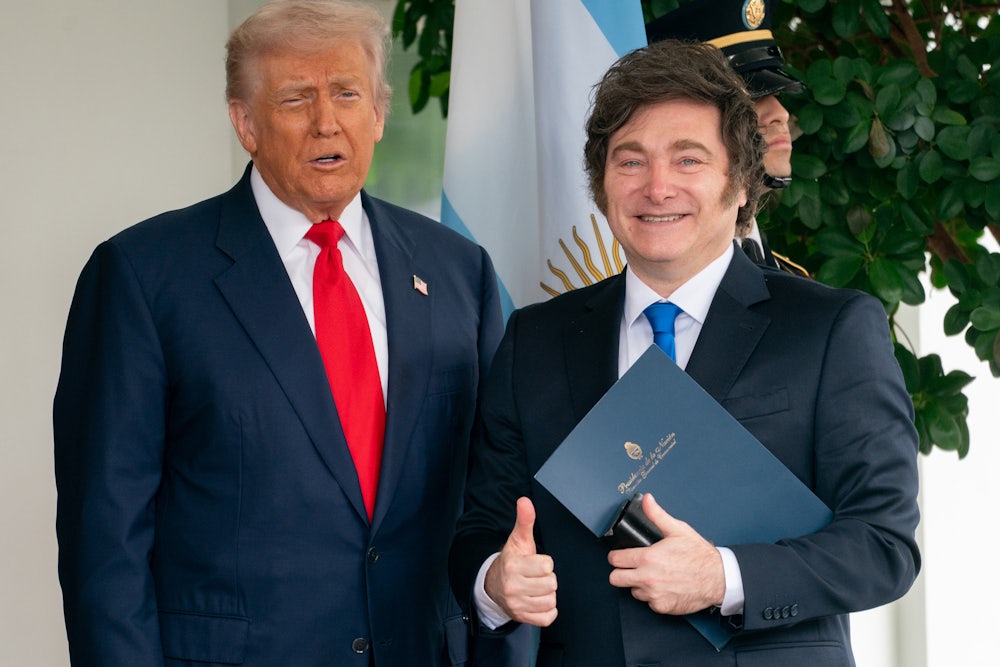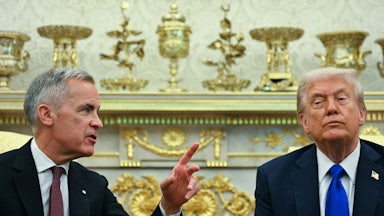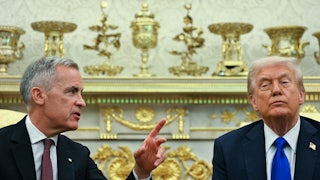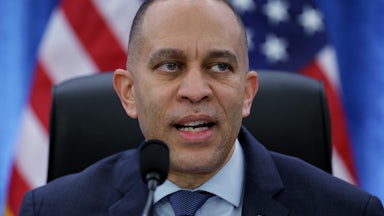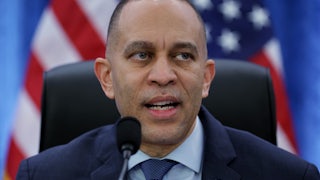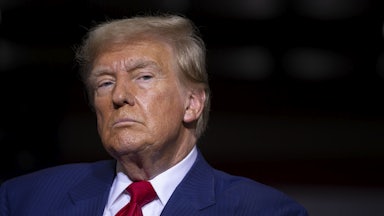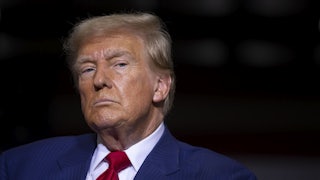The Movistar arena in the Villa Crespo neighborhood of Buenos Aires seats approximately 15,000 people, and on October 6, virtually all of them were clapping, chanting, or otherwise grooving to a steady soundtrack of American rock classics: “Highway to Hell” by AC/DC, “Paint it Black” by the Rolling Stones, and “Bad to the Bone” by George Thorogood and the Destroyers, to name a few. At one point, the crowd spontaneously broke into the wave; at another, they held their phones aloft as though they were Zippos or Bic lighters.
But these people were not here to catch the last gasps of Guns N’ Roses or the ageless funk-metal act Living Colour, both of which will be performing in the capital in the coming months. Instead, they had come for the launch of former television personality and current Argentine President Javier Milei’s newest book, La Construcción del Milagro (The Construction of the Miracle).
Shortly before 9 p.m., more than half an hour after Milei was scheduled to take the stage, the lights went out, and an excited hum fell over the arena. A series of videos were projected on the more than 2,000 square foot screen above the main stage. The first displayed a man in profile blowing a giant shofar. This eventually gave way to scenes of violent destruction: buildings collapsing in controlled demolitions, wildfires, and even nuclear explosions. Finally, the drums of the Argentine rock band La Renga kicked in, and Milei began wending his way to the stage through a mob of adoring supporters, his mere presence igniting chants of “Li-ber-tad!”
By the time he clambered onstage, he seemed out of breath, but that didn’t stop him from belting out the chorus to the song “Panic Show.”
Por favor no huyan de mi
Yo soy un rey de un mundo perdido
Soy el rey y te destrozaré
Todos los cómplices son de mi apetito.There’s no use running
I am the king of a lost world
I am the king, and I will destroy you
I have an appetite for accomplices.
With his trademark black leather jacket, thick sideburns, and pallid complexion, he had the affect of a slightly manic vampire.
Nearly two years after vowing to demolish the Argentine political caste and take a chain saw to the country’s bureaucracy, both Milei and his administration find themselves at a crossroads. In September, the Argentine Central Bank was forced to sell $1.1 billion in reserves over 72 hours to backstop the country’s plummeting currency and keep its value beneath 1,475.32 pesos to the dollar—then the outer limit of a floating exchange rate established as part of an April arrangement with the International Monetary Fund.
While certain economic indicators have since improved, faith in Milei’s radical libertarian experiment has begun to falter. October polling from Zuban Córdoba & Associates found that more than 64 percent of the population now disapproves of the government thanks to an increased cost of living alongside steep social spending cuts. A string of corruption scandals involving cryptocurrencies, illicit payments, and alleged narcos hasn’t helped much, either.
All of these attendant shocks have already begun to drag down the president’s electoral coalition, La Libertad Avanza, or LLA, which recently suffered a double-digit loss to its Peronist opposition in Buenos Aires’s bellwether provincial elections. With midterms scheduled for October 26, the U.S. Treasury Department has put its talon on the scales by promising a historic bailout if Milei stays the course. Yet several weeks after announcing its negotiations with Argentine officials, the Trump administration’s true motivations remain opaque even as the instability of the country’s economy—and its self-described anarcho-capitalist leader—have never been clearer.
Here in his second term, Donald Trump appears to be pursuing a foreign policy rooted in the original Monroe Doctrine, in which Latin America falls under the sphere of influence of the United States. After a failed attempt to overthrow Venezuelan autocrat Nicolás Maduro during Trump’s first term, the U.S. military, under the direction of White House deputy chief of staff Stephen Miller, has launched extrajudicial airstrikes on several boats off Venezuela’s coastline that the administration claims, spectacularly, are transporting fentanyl and other drugs. These strikes have killed more than 20 and destroyed at least one Colombian vessel, according to the nation’s president, Gustavo Petro. On Wednesday, Trump ratcheted up his pressure campaign, acknowledging that he had authorized the CIA to conduct covert action inside Venezuela’s borders. For Juan Tokatlian, a professor of international relations at Torcuato di Tella University in Buenos Aires, these acts and the administration’s eagerness to support the Milei government fit a larger pattern.
“You have two governments in Guyana and Trinidad and Tobago that are part of a diplomatic encirclement of Venezuela,” Tokatlian told The New Republic. “The United States already has control of [Nayib] Bukele in El Salvador, [Daniel] Noboa in Ecuador, and Santiago Peña in Paraguay. The governments of Peru, Costa Rica, Guatemala, Panama, and the Dominican Republic are all ready to cooperate with the United States. The center left is underwater in Chile and Colombia, and then you have the most important election in Brazil next October.
“If all four South American governments were to swing right,” says Tokatlian, “then the United States would find the entire hemisphere in its power again. That’s why it’s so important for Trump that Milei and his economic model succeed.”
What exactly this means in practical terms has yet to be defined, but Argentina offers a few clues. On September 30, less than a week after agreeing to Trump’s bailout, the Argentine president signed an executive order allowing 30 officers from the elite U.S. maritime unit the Naval Special Warfare Command to carry out exercises alongside Argentine forces at three separate bases in Mar del Plata, Puerto Belgrano, and Ushuaia, the closest city to the Antarctic continent.
Tokatlian contends this is part of a broader effort to decouple Argentina from China, which operates a space station in the Patagonian province of Neuquen, and has an agreement to build a Hualong One nuclear reactor in Buenos Aires. Still, he and others remain skeptical that Trump will succeed on that front, in part because Beijing remains Argentina’s second-largest trade partner behind only Brazil.
“I struggle to see the geopolitical strategy here,” said Michael Paarlberg, an associate professor of political science at Virginia Commonwealth University and the Latin America adviser to Bernie Sanders during the 2020 Democratic primary. “Argentina is not a top trade partner of the United States, doesn’t send a lot of migrants its way, and isn’t a pass-through country, obviously. And if the Trump administration were really concerned about China, it wouldn’t be pissing off Brazil, which is the region’s largest economy.” (Trump has revoked the visas of six Brazilian judicial officials and imposed sanctions against the wife of Supreme Court Justice Alexandre de Moraes, following the conviction of former President Jair Bolsonaro for an attempted coup. He has also placed a 50 percent tariff on Brazilian goods, although talks with his presidential counterpart, Luiz Inácio Lula da Silva, are ongoing.)
“This is Trump picking favorites with individual leaders who share his ideology and kiss his ass, frankly. But maybe kissing Trump’s ass is the smart move for Milei. When your country is one of the largest sovereign debtors in the world, you have limited cards to play.”
Irma Gamarra waited patiently outside the Movistar Arena two hours before the book event and vanity rock concert. A gaunt woman of 42, with raven hair and a matching black bubble coat, she made the 90-minute flight from Corrientes with her husband to support the right wing populist. Previously, she claimed, she had voted for “Kirchnerismo,” a progressive political coalition spearheaded by President Néstor Kirchner and later his wife and successor Cristina Fernández de Kirchner, who is currently serving six years under house arrest for graft. After years of “political devastation,” however, Gamarra acknowledged she was drawn to Milei’s “futuristic” economic model.
“We need to move away from social assistance,” she said. “This country has made a mess of public spending.”
For more than a year now, dozens, if not hundreds, of retirees have faced down an increasingly violent police force in front of Congress each Wednesday to protest skyrocketing medical costs and pensions that have fallen below the breadline across multiple administrations. In August, Milei vetoed a congressional vote that would have raised the minimum monthly payment of 384,305 pesos, which includes a 70,000-peso bonus, by 7.2 percent. That’s between $270 and $290, depending on the exchange rate.
“In my generation, there are a lot of retirees who have never contributed anything in their lives,” Gamarra continued. “They have a lot to think about.”
As for the corruption charges that have followed the Milei administration, she argued they were the work of his political enemies and that his inner circle had failed to “protect him.”
“I have no doubts about my president,” she added. “That’s why I support him. That’s why I believe. That’s why we need to eliminate the deficit.”
On February 14, at approximately 7 p.m. Buenos Aires time, Milei issued a curious post on the social media platform X promoting a digital coin called $LIBRA. Claiming the coin was linked to a “private project,” the president promised that its purchase would “stimulate the growth of the Argentine economy by funding small businesses and local startups.” Within the hour, the token’s value shot up to $5.54 as its market capitalization reached $4.5 billion. Then came the rug pull. In a matter of minutes, $LIBRA fell to $1.44 as initial investors cashed out, eventually costing traders more than $250 million.
Alternately dubbed crypto- and $LIBRA-gate, the scandal has prompted two lawsuits in New York and Argentina—the first accusing Kelsier Ventures CEO Hayden Davis of RICO violations, and the second involving the president, two of his business associates, former adviser to Argentina’s National Securities Commission Sergio Morales, and Milei’s sister, Karina, who serves as secretary general in his administration. In separate reports from La Nación and CoinDesk, an outlet that focuses on the trading of digital currencies, Davis reportedly bragged of Milei, “I control that n****. I send $$ to his sister and he signs whatever I say and does whatever I want.”
Karina Milei is no stranger to this kind of malfeasance. Nicknamed by her adoring brother “el jefe,” the masculine term for “the boss,” Karina found herself at the center of a local media firestorm in late August when leaked audios of National Disability Agency head Diego Spagnuolo accused her of accepting bribes from medical and pharmaceutical companies totaling between $500,000 and $800,000 monthly in exchange for state contracts. The administration responded by firing Spagnuolo and issuing a media embargo on the recordings that it later lifted under pressure by organizations like Amnesty International and the Argentine Journalism Forum.
“To the extent that such a thing exists, the first family is not normal,” offered Juan Luis Gonzalez, a journalist and the author of the Milei biography El Loco. “We’re talking about a president who claims he can communicate with his dead dog in the afterlife. Both he and his sister suffered terrible trauma at the hands of their parents, but especially Javier, who was incredibly lonely as a child.
“Karina has an emotional monopoly over her brother, and this invariably leads to trouble,” he continued. “She will torpedo his friendships and even his romantic relationships. But if Javier has a messianic complex, his sister has a voracious appetite for money that leads her to dip her hand in the cookie jar time and again. This happened when Milei was a member of Congress and has continued in La Casa Rosada.”
Although the latest corruption allegations against Karina are among the most high-profile, they are hardly the only ones that have been levied against LLA. Earlier this month, José Luis Espert, a national deputy representing Buenos Aires province, was forced to scuttle his reelection bid after it was revealed that he had accepted a $200,000 payment from accused drug trafficker and money launderer Federico Machado. Both Milei and Espert insist that the charges are part of a political operation against their movement, and the latter maintains that “time will show we are not all the same.” Adding insult to political injury, the National Election Board has since denied an LLA request to reprint its paper ballots for Buenos Aires, meaning that Espert’s name will remain on the ticket when voters head to the polls later this month.
If the president was at all concerned that night about his country’s sinking economy, or his coalition’s slumping electoral prospects, he kept his cards close to his heaving chest. Indeed, he was downright ebullient as he tore through Argentine rock anthems like “El Rock del Gato” by Los Ratones Paranoicos and “Blues del Equipaje” by La Mississippi. Singing back up and skipping around onstage to a rhythm mostly their own were LLA Deputy Lilia Lemoine, a onetime Manga and Marvel cosplayer, and Ana Tamagno, an aspiring congresswoman and the wife of Milei’s presidential biographer, Marcelo Duclós. On the drums was another LLA deputy, Alberto “Bertie” Benegas Lynch, a libertarian who has advocated for privatizing the ocean.
Long before pursuing a career in politics, Milei sang in a Rolling Stones cover band called Everest, and his sense of showmanship is undeniable. Midway through his set, he declared that the evening was “missing some fire,” which in turn triggered several onstage pyrotechnics. Amid several audible gasps from the audience, he then launched into “Dame Fuego” by Sandro, Argentina’s campy answer to Elvis Presley during the 1960s and 1970s. If you squinted—hard—you might even convince yourself you were watching an actual arena rock show, replete with a preening lead singer and his fiendish femme cohorts.
Reality intruded with a rendition of “Hava Nagila.” Written in 1918 by the Jewish composer Abraham Zevi Idelsohn, the folk song is traditionally performed at weddings, bar mitzvahs, and other celebrations. Milei, an ardent supporter of Israel and a would-be convert to Judaism, who has compared his struggle to that of the ancient Maccabees, opted instead to use it as a tribute to the victims of Hamas on October 7, 2023. After previously singing along to Sandro, the crowd fell mostly silent, baffled by the Hebrew lyrics their president was shouting at them over the band.
Between these performances, the event’s organizers projected a pair of confounding compilation videos. The first featured an ecstatic-bordering-on-weepy Milei embracing a series of celebrities and dignitaries that included Sylvester Stallone, Elon Musk, Salvadoran President Nayib Bukele, Italian Prime Minister Giorgia Meloni, and Donald Trump himself. The second included a montage of images and scenes from conservative Charlie Kirk’s final public appearance at Utah State University—a video that culminated in close-range footage of his gruesome assassination. As Kirk lurched back and bled out on-screen, the audience erupted in a show of support for the fallen Turning Point USA director.
Milei’s final number of the evening was a cover of Charly Garcia’s “Tu Vicio,” a song about how we’re unable to quit our own vices. The Argentine head of state then announced to the LLA faithful that he needed to take a break so that he could “bathe” and “look like a president.”
During the intermission, Milei’s fans made their way to the aisles. Several concession stands in the lower bowl had run out of hamburger patties earlier in the evening, so attendees dined on pink panchos con papas fritas—foot-long hotdogs topped with miniature french fries. At different gates were book stands with titles like El Libro Negro de la Nueva Izquierda (The Black Book of the New Left) by Nicolas Marquez and Agustín Laje and Como Fabricar Una Feminista … (How to Make a Feminist …) by the Brazilian reactionary Sara Winter Huff. Each featured piles upon piles of Milei’s latest, whose cover photo displayed the president pouting over a chain saw with the inscription “las fuerzas del cielo” (“the forces of heaven”)—a reference to both his followers and the mystical powers with which he claims to govern.
Published by Hojas del Sur, which bills itself as the publishing house of Argentina’s culture war, the book’s flap copy boasts that readers will learn the “recipe that saved [the country] from what would have been an unprecedented political, social and economic crisis” and created “the most successful stabilization case in world history.”
Since assuming office in December 2023, Milei has radically reduced monthly inflation from 11.9 percent that November to 2.1 percent last month. He has likewise succeeded in lowering poverty from 41.7 percent at the end of his Peronist predecessor Alberto Fernández’s presidency to 32 percent through the first half of this year, although the Pontifical Catholic University of Argentina’s Observatory on Social Debt has suggested this decline may be “overrepresented.”
Nevertheless, there are multiple reasons to believe the Argentine economy had been sinking, if not teetering on collapse, before the U.S. Treasury sprang into action. Efforts to integrate the nation’s sprawling villas (slums) into their respective cities have stalled out, while families are struggling to stay afloat amid debilitating cuts to soup kitchens, energy and transportation subsidies, and much more. Milei has also taken out a $20 billion loan from the IMF to help shore up his country’s depleted reserves, and in September, Argentina’s country risk, which measures its likelihood of debt default, briefly soared above 1,200 points.
“Milei was facing the end of his government,” said Diego Guelar, the Argentine ambassador to the United States from 1997 to 1999 and 2002 to 2014. “Confidence in him had cratered, and the country was facing its first default since 2001. I’ve been Argentina’s ambassador in Washington twice, and I’ve never seen a bailout quite like this. The administration may have averted a crisis for now, but finding a long-term solution will depend on all of us.”
On September 24, in a post on the social media platform X, Treasury Secretary Scott Bessent announced that U.S. government was prepared to “do what is needed to support Argentina and the Argentine people,” citing the country’s “geopolitical strategic importance.” In recent weeks, the terms of Trump administration’s relief package have slowly come into focus. They include a “significant” standby credit line via America’s Emergency Stabilization Fund, a $20 billion currency swap, and the purchase of Argentina’s dollar bonds. (The Treasury has already bought up Argentine pesos on the foreign exchange market.) Bessent has likewise indicated that his department is working with private-sector investment funds to create a separate $20 billion facility that would invest in the country’s sovereign debt.
“Despite the tens of billions that Washington arranged in April from the IMF, World Bank, and Inter-American Development Bank, Argentina’s economy has remained vulnerable to currency crises,” explained Mark Weisbrot, co-director of the Center for Economic Policy. “The country’s sovereign bonds are rated in junk territory, which means bondholders are making a speculative investment and can sell off at the first sign of news they perceive to be bad.”
Days after Bessent’s initial post on X, stories in both countries began circulating that the billionaire founder of Discovery Capital Management, Robert Citrone, was heavily invested in Argentina, and that he had long-standing ties to Bessent dating back to their time together at Soros Fund Management. Then, on October 9, The New York Times reported that investment firms including Blackrock, Fidelity, and Pimco all stood to profit handsomely from the Trump administration’s rescue plan. Bessent has separately told Fox News’s Laura Ingraham that Argentina is “rich in rare earths and uranium,” and that he expects they’ll be “committed to U.S. private companies coming in and being good partners with them.”
“What people need to understand is that this not a bailout,” said Juan Grabois, a prominent social activist and Peronist candidate for president during the 2023 election cycle. “I read the Democrats’ original letter to Trump, and it sickened me that somebody like Bernie Sanders, who I know and respect, would call it that. This is an attempt to rescue a failing, far-right government. In Milei, Trump has found a court jester who he can use as his South American spokesman. And when that spokesman ceases to be of value, he’ll throw him away like he would a used condom.”
A summit at the White House this week between representatives of the two countries would seem to bear out Grabois’s suspicions. During the lunch event on Tuesday, Trump revealed that although the United States is prepared to move forward with a bailout, it would “not be generous with Argentina” if Milei were to lose. (In typical Trump fashion, it was not immediately clear if he was referring to the upcoming midterms or Argentina’s 2027 election, when the the president he endorsed personally could be a lame duck.) “If he wins, we’re staying with him, and if he doesn’t win, we’re gone.”
Bessent was more to the point.
“We’re confident that the president’s party will, and the coalition will, do well in the [midterm] election,” he said. “Going back to failed Peronist policies would cause a U.S. rethink.” The treasury secretary has since clarified that the United States will support the Argentine government regardless of how it performs later this month so long as it continues to pursue “good policies.” Speaking to reporters on Wednesday, he described his department’s approach as that of “an economic Monroe Doctrine.”
Last week, Massachusetts Senator Elizabeth Warren, the ranking member of the Senate Banking, Housing, and Urban Affairs Committee, introduced a bill formally blocking the package. Republicans, meanwhile, have gone largely silent since Senator Chuck Grassley of Iowa protested Trump’s willingness to enable a competing soybean exporter. Georgia Representative Marjorie Taylor Greene, an outspoken member of the America First movement who has bucked the president on issues ranging from Israel to health care and tariffs, did not respond to repeated requests for comment.*
Milei reappeared onstage sometime after 10 p.m. with an Argentine flag draped over a fresh suit and tie. After growling his way through the national anthem, he finally got down to the business of the evening: a discussion with Buenos Aires Aires city legislator and presidential spokesman Manuel Adorni about the themes of his latest book and the future of the country more broadly. By then, the crowd had noticeably thinned and the mood had grown subdued.
Over the next half hour, Milei delivered a discourse that has become familiar to Argentine and American audiences alike. He railed against the evils of cancel culture and “wokeismo,” denouncing what he called the left’s penchant for political violence. He extolled the “colossus of the world” Donald Trump to a smattering of applause. He implored his voters to not let up in the next election, that “freedom must advance, or Argentina will go backward.” And through it all, the flag sat bunched in his lap like a child’s blanket.
As the audience filed out past a Maybelline New York lipstick station and a Smirnoff-sponsored selfie booth, Milei concluded his event as only he could—with a promise to “make Argentina great again.”
* This article originally misidentified Marjorie Taylor Greene.
